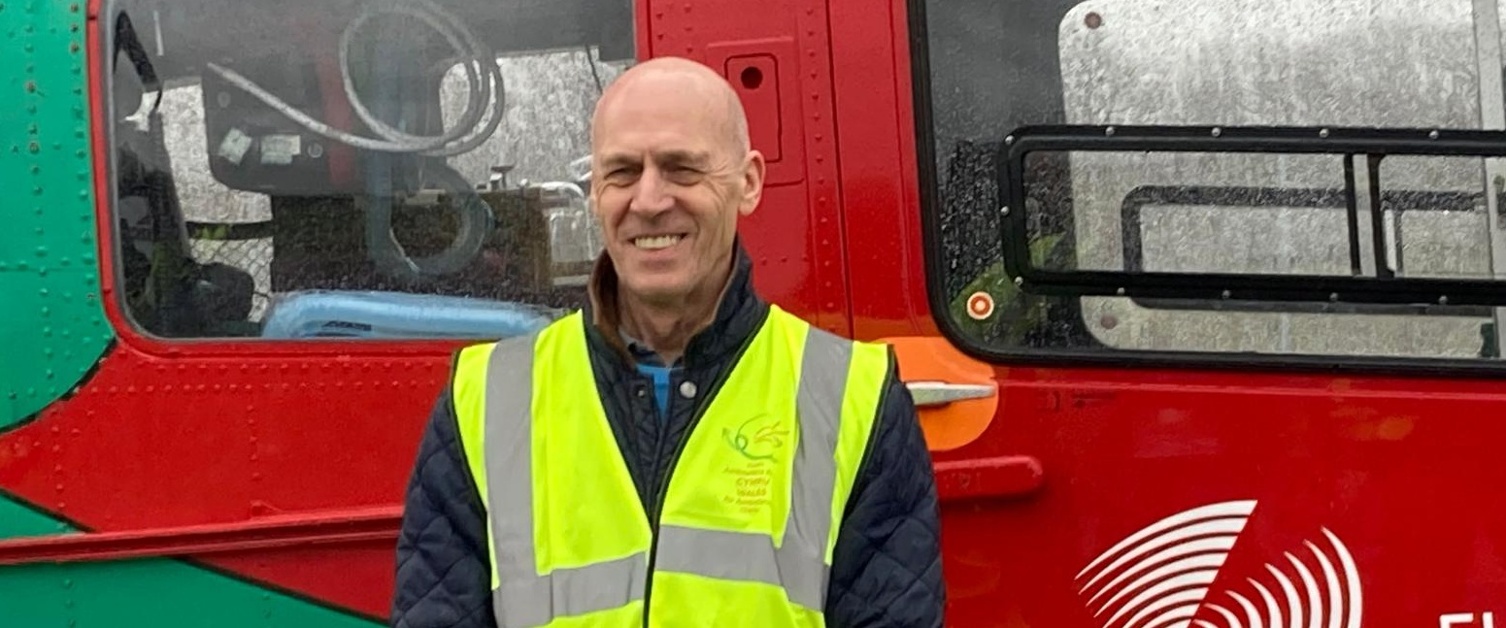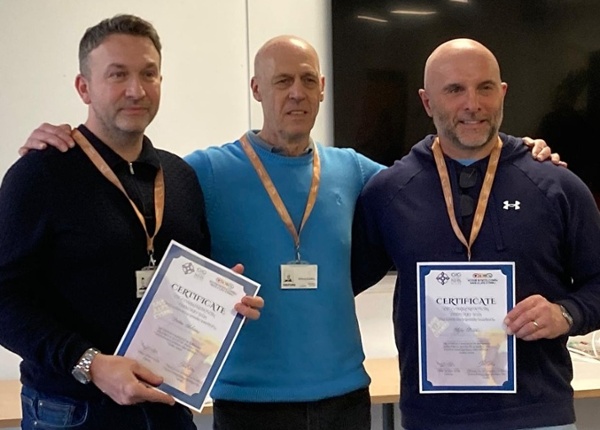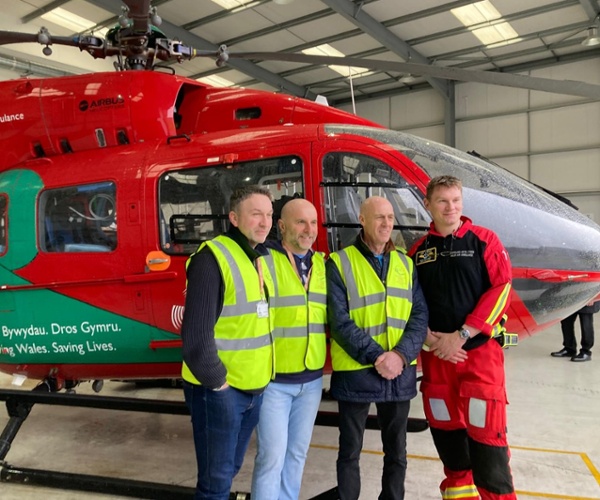Grateful man thanks medics and bystanders for saving his life

In October 2024, Anthony Crothers had enjoyed a walk in Gower with his two friends when he suddenly collapsed and nearly lost his life.
Anthony stopped breathing outside the shop in Three Cliffs Bay, Gower. His friend Glyn Dewis, with the help of two other bystanders, Dean and Jamie, rushed to his aid. They called 999, started chest compressions and attached a community defibrillator, which delivered one shock.
By pure coincidence, four off-duty doctors arrived at the scene and assisted with resuscitation, whilst they waited for the paramedics to arrive.
The doctors performed five cycles of CPR and Anthony was given five shocks from the defibrillator. Thankfully, his heart restarted just before the paramedics arrived.
The paramedics carried out a rapid assessment, gave Anthony some oxygen, supported his airway and attached him to all their monitoring machines.
Due to his condition, the Wales Air Ambulance was called to give Anthony hospital-standard care in the car park. When the air ambulance crew arrived, Anthony was still unconscious and needed support with his breathing. Anthony’s pulse was very slow and weak.
The EMRTS (Emergency Medical and Retrieval Transfer Service) medics on board Wales Air Ambulance, Consultant Dr Iain Edgar and Critical Care Practitioners Derwyn Jones and Rhyan Curtin, stabilised him by inserting a breathing tube and attaching him to a ventilator. Taking over Anthony’s breathing ensured enough oxygen was getting to his brain, preventing brain damage.
Whilst the Welsh Ambulance Service paramedics contacted Morriston Hospital to arrange for a direct transfer to the cardiac centre, the air ambulance crew gave Anthony adrenaline to keep his heart rate and blood pressure within normal limits.
Whilst under the constant supervision of the Wales Air Ambulance medics, Anthony was then airlifted to the Intensive Care unit at Morriston Hospital, where he required cardiac stents to be inserted (small, expandable mesh tubes used to widen blocked or narrowed coronary arteries, improving blood flow to the heart). Anthony spent a week there, before being transferred to the University Hospital of Wales Intensive Care Unit, to be a bit closer to home.
After nine days on a ventilator and nearly four weeks in hospital, he was discharged home, where he went on to make a full recovery. Anthony now takes daily medication and is doing very well.
Recently, Anthony was delighted to be reunited with some of the people who attended to him on that day.
Anthony has said the day of his cardiac arrest was a total ‘blur’ to him. He looks at pictures on his phone and wonders who took them, even though it was him. He said: “I have zero recollection of what happened to me. It may be the brain’s safety mechanism of wiping away the trauma. The first thing I remember is waking up in the intensive Care Unit in Cardiff and wondering what I was doing there.”
Anthony added that he had never had any significant health problems before his cardiac arrest but had numerous family members who suffered heart problems.
He said: “From a personal point of view, I’ve tried to keep fit. I have a problem with my knee, which is from playing football. But the only other time I had been in hospital, apart from a knee operation, was when I had my tonsils out at 21.”

Anthony, along with his wife, recently visited the Wales Air Ambulance Charity headquarters in Dafen, Llanelli.
He met one of the Wales Air Ambulance medics, Dr Iain Edgar, who treated him. The emotional day saw Anthony reunited with the off-duty doctors and the bystanders.
Friend Glyn said: “What I remember about the actual day, when it all happened, was that it was the second day of a two-day road trip that we'd been on. The weather was great, we went down onto the beach at Three Cliffs Bay and we were just walking back.
“He turned his back to me as we got to the boot of the car and it was just surreal. I just heard him say the words, ‘oh God’. I said ‘what’s the matter, mate’, and he fell backwards and I caught him.”
Reflecting on how important the service is for the people of Wales and people visiting Wales, Glyn said: “I’m just really grateful that there is a service in place like the Wales Air Ambulance, and that there are people who are willing to put themselves in that incredibly stressful position to fly out and treat people. It's just amazing, absolutely amazing.”
Glyn has had emergency first aid training on and off for over 30 years. He said: “It is incredible to have played a part in Anthony’s recovery. It is surreal! How often does someone go through their life and be able to say they’ve helped save another person, unless they’re in the medical profession?”
The 66-year-old father-of-three and grandfather-of-five, said: “My recovery has been going well. I say ‘going’ because it is ongoing and I intend to keep fit, keeping on with the fitness regime.
“Coming to terms with what has happened has been a little surreal because you think you’re invincible, until something like this happens. When I was discharged from hospital, I had a little bit of medical anxiety, where I was scared to go to sleep in case I didn’t wake up.
“When my bladder woke me up early in the morning, I was relieved to think ‘I’m still here then’. I’m getting there. I don’t get any anxiety anymore but visiting the Wales Air Ambulance headquarters has been a privilege and it has also helped me put things into place by meeting the people who helped me along the way. It has been a pleasure.”
Anthony went on to receive support from the Charity’s Aftercare Service and was introduced to Patient Liaison Nurse, Jo Yeoman, whose role is to support patients and their families after what is usually a life-altering and sudden traumatic event.
Jo was instrumental in organising for Anthony to meet the individuals who helped to save his life that day.7

Bystander Dean Adams, who said he feels fulfilled by helping save Anthony, was delighted to be part of the reunion. He said: “It felt surreal, I guess, in loads of ways. It just happened in front of me and I think most people would react that way because there's no other way to react. It’s been amazing meeting Anthony.”
The bystanders on the day have since been presented with certificates for helping to save the life of another from Save a Life Cymru, who promote public awareness of CPR and defibrillator use, for providing lifesaving care.
Julie starling, Clinical OHCA programme manager for Save a Life Cymru said: “It’s important that we recognise the action of those people willing to give CPR a go regardless of the outcome, doing something is so much better than doing nothing at all. This story highlights how taking action can save a life and that we all have a role to play as part of a wider team in that chain of survival. It’s important that everyone in Wales is familiar with the process of performing CPR, which can be easily achieved by watching a short video. The 999 call-taker will tell you how to do CPR, but we all need to be prepared to act fast so we can help each other.”
Mark Tonkin, Paramedic and Learning and Development Manager, said: “I truly believe that without the quick-thinking actions of Anthony’s friend, Glyn, and the bystanders, the outcome could have been very different, and Anthony might not be here today."
“The chain of survival worked exactly as it should. From calling 999, retrieving a defibrillator and starting CPR, those at the scene played a vital role in saving his life.
“Senior Paramedic Nathan Amos and Cymru High Acuity Response Unit Paramedic Gavin Williams arrived just before myself and Emergency Medical Technician Holly Batcup, and we were able to provide further care until EMRTS arrived.
“This incident shows what’s possible when a community is prepared - immediate action and CPR awareness can save lives."
Reflecting on what message he’d give to the air ambulance crew that treated him that day, Anthony said: “Firstly, a massive thanks for what they did for me and what they do on a daily basis. They are an incredible crew of people. Thank you for what you did and everything you do. I cannot express my gratitude enough. Without them, and the people who helped me, I wouldn’t be here. My feeling towards the Wales Air Ambulance is eternal gratitude.”
The Wales Air Ambulance is consultant-led, taking hospital-standard treatments to the patient and if required, transferring them directly to the most appropriate hospital for their illness or injury.
It is delivered via a unique third-sector and public-sector partnership. The Wales Air Ambulance Charity relies on public donations to raise the £11.2 million required every year to keep the helicopters in the air and rapid response vehicles on the road.
The Emergency Medical Retrieval and Transfer Service (EMRTS) supplies highly skilled NHS consultants and critical care practitioners who work on board the Charity’s vehicles.
This advanced critical care includes the ability to administer anaesthesia, deliver blood transfusions and conduct minor operations, all at the scene of an incident.
As a pan-Wales service, its dedicated crews, regardless of where they are based, will travel the length and breadth of the country to deliver emergency lifesaving care.
Inset: Anthony, centre, with Dean and Glyn